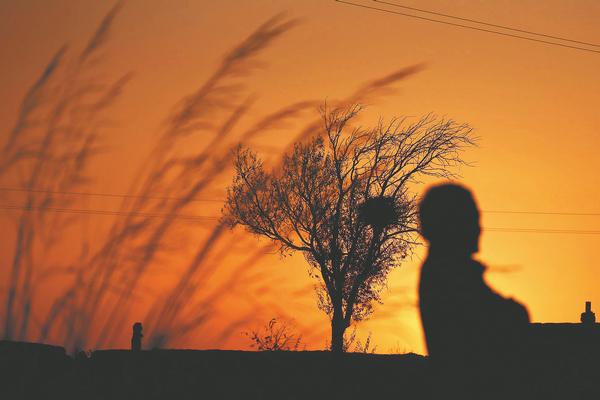

'Peasant poet' Zhang Lian, whose words paint vivid pictures of his remote, vast home, has captivated and inspired professors and plumbers alike, Zhao Xu reports.
One early morning in April 2018, Liu Keming, having been "jostled awake", stepped outside of her carriage on the night train to be "greeted by the instant coolness of the steppe air mixed with that sweet, earthy smell of the alluvial plains".
That's how she recounts the experience in the introduction to Twilight, her translated anthology of works by Chinese poet Zhang Lian, which was published in September 2022.
Her destination was Yanchi, a small county sitting in Wuzhong, Northwest China's Ningxia Hui autonomous region that borders the Inner Mongolia autonomous region to its north. The land, where the desert steppes meet the loess plateau (more commonly known in China as the yellow-earth plateau), dictates for the locals a half-farming, half-herding lifestyle, one that Zhang had reluctantly embraced for many years.
The aim of the trip was for Liu, a professor of linguistics and world literature at the City University of New York, to absorb "the color and the light", which she had discovered upon her first encounter with Zhang's words while sitting in her own home on the East End of New York's Long Island, a place drenched in both.
But the differences couldn't be greater.
"This is where the poet Zhang Lian lived and wrote all these years, where the vast expanse of emptiness, blue sky above, yellow earth below and a dark road cutting right through it, reminds one of a (Mark) Rothko painting," Liu wrote of her first impressions of the arid, rain-starved landscape.
Of all things, Liu was struck by its expansiveness — previously unknown to her, as she grew up in Chinese cities before leaving to pursue her studies at Columbia University in 1987. "The sight filled me with pride. Immediately I understood Zhang's love for it," she says.
"In Village 39/by a large alkaline lake/tufts and tufts of purple/form a patch of twilight," wrote Zhang in A Patch of Falling Color, originally titled Twilight, referencing that special time of day, just like all the other poems in the anthology.
"I've always believed that the twilight is infinitely more beautiful than beams of the rising sun. Why? Because it's radiant, but at the same time warmer, gentler, calmer and therefore a lot more soothing," says Zhang, who, in another poem, sauntered on the village road "with a bag of twilight and a donkey".
And when he talked about "gathering water in twilight" in yet another poem, one gets the feeling that he was gathering twilight in water.